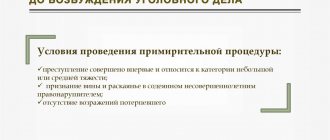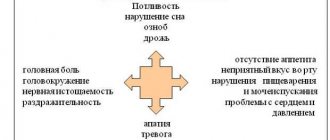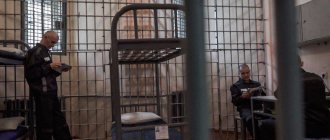Is a convicted person required to work in prison? How does re-education through labor take place in places of deprivation of liberty?
According to Part 1 of Article 103 of the Criminal Executive Code of the Russian Federation (hereinafter referred to as the Penal Code of the Russian Federation), everyone sentenced to imprisonment is obliged to work in places and at jobs determined by the administration of correctional institutions. The administration of correctional institutions is obliged to attract convicts to work, taking into account their gender, age, ability to work, state of health and, if possible, specialty, as well as based on the availability of jobs.
The penal system in the Russian Federation: how it all works
If a criminal is sentenced to imprisonment, he ends up in a correctional facility. Article 74 of the Penal Code of the Russian Federation specifies 4 types of such institutions:
- prisons;
- educational colonies;
- correctional colonies;
- medical correctional institutions.
Correctional institutions are intended to house adult convicts. There are four types of such colonies:
- general regime correctional colonies;
- maximum security colonies;
- special regime colonies;
- colony settlements.
Those convicts who received a sentence for committing a crime through negligence serve their sentences in settlement colonies. Also included here are those who have broken the law for the first time. Only those criminals who have committed crimes of minor or medium gravity with a term of imprisonment of up to five years can enter the colony-settlement. In addition, a prisoner can be transferred here from a general or strict regime colony, subject to his exemplary behavior.
Convicts live in a colony settlement without security. That is, they can move freely around the facility. Administration staff monitor order on the territory of the penal colony. Surveillance is carried out around the clock.
In a colony-settlement, prisoners can wear civilian clothes and carry valuables and money. The number of visits with family and friends is not limited. Convicts are also allowed to leave the colony if required for education and work.
On the territory of the colony-settlement, prisoners live in dormitories. If the prisoner has a family, then he may be allowed to live with his wife and children on the territory of the colony or municipality (city, village) in which the colony is located. However, this is only possible if the prisoner demonstrates exemplary behavior.
Men and women who have committed a serious crime for the first time are sent to general regime colonies. The maximum sentence should be up to 10 years in prison. If it is more, the prisoner is sent to a special, strict regime colony or prison. Prisoners from other penal colonies that have a lighter or stricter regime of detention can be transferred to a general regime colony.
While in a general regime colony, convicts live in dormitories. The number of dates and packages for them is limited. Thus, a prisoner who does not violate the rules of the colony can have 4 long and 6 short visits during the year. He can also receive 6 parcels and parcels per year.
If there are violations, the number of parcels and visits may be reduced. In addition, such a convicted person may be sent to a punishment cell or punishment cell. We are talking about separate locked rooms in which prisoners are kept in complete isolation.
Prisoners in the punishment cell are prohibited from telephone conversations, visits, parcels and parcels. The prisoner will not be able to take food or personal belongings into the cell with him. The exception is for essential items. Shopping for groceries is also prohibited, as is smoking.
Non-working prisoners in a punishment cell are allowed only an hour-long walk once a day. Persons undergoing training are prohibited from attending classes until the end of their sentence.
General regime penal colonies and penal colonies can be either male or female. Maximum security correctional colonies house only men. This includes persons who have committed serious crimes and received a sentence of more than 10 years in prison. Repeat offenders are also kept in such penal colonies.
Here prisoners live in dormitories, having the right to three short-term and three long-term visits per year. Every year they can receive 4 parcels and 4 parcels. For violating the established procedures, the prisoner may be sent to a punishment cell.
Special regime colonies also contain only men. The following criminals are sent here:
- those sentenced to life;
- those sentenced to death (at the moment this punishment is replaced by life imprisonment);
- especially dangerous repeat offenders (if a person committed a crime with an unexpunged or unexpunged criminal record).
In these colonies, prisoners are allowed two short-term and two long-term visits per year, as well as 3 parcels and 3 parcels. Violators of the established order are kept in cell-type premises. They are locked and look like cells in prisons. These are small rooms with barred windows and bunks.
Juvenile colonies are used to house juvenile offenders. The following conditions for serving the sentence are established:
- lightweight;
- ordinary;
- preferential;
- strict.
The conditions determine the number of parcels, dates and general living conditions. For example, people on preferential terms can wear regular clothes.
Prisons are designed to house male criminals. This includes the following persons:
- Those who received a sentence for committing especially serious crimes. A person sentenced to more than five years of imprisonment can go to prison.
- Particularly dangerous repeat offenders.
- Convicted of crimes such as terrorism, armed rebellion, violent seizure of power, illegal handling of nuclear materials, etc.
- Malicious violators of prison order.
In prisons, the freedom of prisoners is significantly limited. Here, convicts are kept in common locked cells or solitary confinement. Prisoners cannot move freely around the prison. By default, they are entitled to only 2 short-term and 2 long-term visits annually, and the same number of parcels. Every day, prisoners walk in the fresh air for two hours.
Treatment and prevention institutions are places where prisoners with alcohol or drug addiction, patients with tuberculosis and people with mental disabilities are placed.
Salary increase in 2022 for state employees, the Ministry of Internal Affairs of the Ministry of Emergency Situations, the FSSP and the Federal Penitentiary Service when and by how much, in Russia by region
Salaries are paid to different categories of workers from the state and municipal budgets. These are law enforcement agencies (army, law enforcement agencies, bailiffs, FSIN, etc.), civil servants, tax and judicial authorities. They also include those who are traditionally called “public sector employees”: doctors and health workers, teachers and educators, researchers, cultural workers, social services.
The indexation of wages for categories of public sector employees who are not affected by the May decrees of the Russian President will be 4.3% in 2022, Deputy Minister of Labor and Social Protection Lyubov Yeltsova said at a meeting of the General Council of the Federation of Independent Trade Unions of Russia. “It is planned that indexation for unspecified categories from October 1 will be 4.3% in 2019, 2022 - 3.8%, 2022 - 4%,” said a representative of the Ministry of Labor.
What positions are there in the colonies?
Despite the fact that work in the IR cannot be called prestigious, you can get a job here solely through connections. Mostly, administration employees employ their relatives and friends. I simply won’t take people here without recommendations.
The staff of the colony is quite wide. There is a whole department here dedicated to pension savings. But one of the most prestigious is the position of educational inspector. It involves career growth - over time you can become a deputy chief. Relatives of the previous boss usually apply for the position of the boss, so it is difficult to get such a position.
However, with long-term diligent work, anything is possible. And this is one of the main advantages of working in the Federal Penitentiary Service. After several years of work, the head of the detachment may become the head of the department. Then he becomes a deputy and even the head of the colony.
Another advantage of the work is reliability and stability. Reductions and dismissals in the field of execution of punishments are very rare. Even during the crisis, the zones continue to operate without staff reductions. In addition, most employees perform fairly simple work without a high level of responsibility.
The colony staff is divided into two groups:
- certified employees;
- uncertified.
The first are persons with special ranks (from private to general). The work of these employees is equivalent to military service. For this reason, they can enjoy a lot of privileges. We are talking about a longer vacation, the availability of the 13th salary, preferential length of service, when a year of work is considered to be one and a half. Accordingly, you can retire at the age of 35-37. These employees can also count on free trips to a sanatorium and financial assistance in purchasing housing.
Have a question for a lawyer? Ask now, call and get a free consultation from leading lawyers in your city. We will answer your questions quickly and try to help with your specific case.
Telephone in Moscow and the Moscow region: +7
Phone in St. Petersburg and Leningrad region: +7
Free hotline throughout Russia: 8 (800) 301-39-20
At the same time, certified employees have more responsibility. They had to regularly pass fire and physical training standards, be on duty in the colony, and go to training camps. In the event of an emergency, certified employees must come to work at any time.
Non-certified workers have no additional responsibilities or special benefits. Accordingly, their salary is 3-4 times lower than that of certified personnel. However, in the future you can pass certification by serving for 6-8 months and waiting for an order to confer a military rank. The candidate then took a short formal examination and had to take an oath.
Will the salaries of FSIN employees be increased in 2016?
According to official government data, the leadership of the Federal Penitentiary Service proposes to cut about 5,000 employees across the country in 2016, while the layoffs will not affect people employed in executive inspections that monitor the activities of suspended prisoners. Moreover, the range of responsibilities of these workers is expanding significantly, so the government is talking about even increasing the number of people employed in this area, because those 2.5 thousand employees will not be able to do their job efficiently. True, the leadership of the FSIN has repeatedly said that employees of executive bodies do not quite fit into the structure of the department, so it would be nice to separate them into a separate law enforcement structure, so perhaps these changes will happen right now.
In 2012, the President of the Russian Federation implemented a decree on increasing wages for employees of budgetary organizations, which include the Federal Penitentiary Service. The bill contained information that by 2022, wages of people employed in this area should increase by at least 50%, but the crisis changed everything, and just last year the authorities had to take “extreme measures” and decide on suspension of salary increases for public sector employees. Naturally, the question immediately arose about whether there will be a salary increase in the FSIN in 2016? This government structure cannot be called the most ordinary, because the people who work in it must communicate with people who are potentially dangerous to society - those on parole or those convicted, and such work must be well paid, otherwise no one will simply do it.
General requirements for the candidate
To work in the IC in the educational work department, you need to meet the following requirements:
- majority;
- availability of computer and office equipment skills;
- fast typing;
- stress resistance;
- non-conflict;
- absence of a criminal record for both the candidate and his relatives;
- neutral appearance (no piercings or tattoos in prominent places, bright hair, dreadlocks).
When receiving a position through an acquaintance, a person may not have special skills, work experience or special education. Candidates applying for certified positions are subject to more stringent requirements.
Passing an interview
Recruitment to a colony begins with an interview. Here the applicant is told about basic responsibilities, salary and is asked a few standard questions. For example, they ask about where the person studied/worked before and about plans for the future.
If a candidate is suitable for a position, then after the interview the personnel officer usually tells him about it. Next, the person needs to obtain a certificate of no criminal record. You should order it as early as possible, since it will be ready in about a month.
Since the IC is a closed institution, a citizen will need a one-time pass to get here for an interview. It contains the following information:
- Full name of the candidate for the position;
- visit purpose;
- details of the person responsible for issuing the pass;
- date of issue;
- time of action.
Passing a medical examination
While a police clearance certificate is being prepared, the candidate for the position must undergo a medical examination. This can be done in a special clinic for employees. They are attached to it while they work in the colony. In case of illness, you will have to take sick leave here - they won’t accept regular sick leave at work.
To undergo a medical examination, you need to take a referral from the HR department. An examination should be carried out by a psychiatrist, narcologist, ENT specialist, ophthalmologist, or therapist. Women also need to see a gynecologist. The inspection is absolutely free and takes no more than three days.
As a result, the candidate for the position receives a conclusion and can go to work. On the first working day, he will have to sign an employment contract and order, familiarize himself with the internal rules, and listen to instructions. Having handed over the work book to the personnel department, the citizen receives a pass and can begin to master new responsibilities.
Peculiarities of working in a general regime women's colony
In women's general regime colonies, people convicted of distributing and selling drugs mainly serve their sentences. Some women have convictions for fraud and theft, others for murder. On average, there are about 1,000 convicts in such colonies.
Many positions in the IC have impressive titles, but in fact, a person without special skills can cope with the duties of such an employee. For example, a senior inspector in the educational work department is actually involved in document flow and office work.
Most of the prison administration staff are elderly. They do not know how to use a computer, and even working in Word causes them difficulties. Accordingly, they need a person who would prepare orders, certificates, characteristics of convicts and other documents. Basically, these papers are necessary for the parole or amnesty commission.
There is not much paperwork in the colony. Therefore, most of the time the specialist sits aimlessly at the monitor, waiting for the end of the working day. The main thing is to complete the established amount of work, and the rest of the time you can do your own thing.
The working day for most colony employees begins at 8 a.m. and ends at 5 p.m. Accordingly, from 7:30 to 8:30 a queue appears at the checkpoint, which moves rather slowly. The fact is that everyone entering the checkpoint is carefully examined, checking packages, bags, and personal belongings.
Mobile phones are prohibited on the territory of the colony. Employees leave them with the inspector at the checkpoint in the morning and pick them up in the evening after work. Naturally, this rule does not apply to management. And ordinary employees are forced to stay on the territory of the colony from call to call, without communication with the outside world.
Entry into and exit from the colony is carried out directly using passes. By default, correctional officers do not have the right to leave the territory of the colony until the end of the working day. To leave earlier, you must obtain a separate permit. However, some workers manage to persuade their superiors to obtain permanent permission to leave the colony during the lunch break. Such exceptions are usually made for those employees who live nearby and go home for lunch. The rest of the staff eats at the local canteen.
Employees who are late receive reprimands. Everything is strict with discipline in the colony. If an employee must leave the territory of the colony during working hours (for example, to visit the prosecutor’s office or other government agencies), then the boss warns the workers at the checkpoint about this. Similar rules applied to guests of the correctional facility. A separate permit was issued in the name of each visitor, signed by the head of the colony. It indicated the date of the visit.
Upon entering the territory of the colony, visitors had to hand over phones, cameras, and books. They are allowed to move around the facility only with an accompanying person.
Each department head has an assistant from among the prisoners. She carries out various assignments, transmits information and documents to employees. Some prisoners are allowed to work on a computer. Moreover, convicts can work full time, counting accruals and preparing documentation.
Raising the retirement age of the Federal Penitentiary Service
Since in most cases, specialists with 20 years of service or more have the necessary amount of knowledge, skills and experience, and are also capable of performing the tasks assigned to them at a high professional level. Increasing the length of service to 25 years The requirements for a penal system employee can be judged by drawing up a certification that objectively and comprehensively reflects his individual characteristics, knowledge, abilities, skills and their compliance with the position he is filling, including: - professional preparedness, ability solve operational and official tasks corresponding to the official position; - quality and timeliness of performance of official duties; - level of intellectual and cultural development, i.e.
- What the law says
- Indexation of payments
- Long Service Bill
- Salaries and pensions for police officers
The pension reform in the Russian Federation has affected police officers. The latest news in 2022 reports that there may be a change in the income of older people. It is also planned to increase the length of service to 25 police officers. Below we will look at what changes will affect employees of the Ministry of Internal Affairs of the Russian Federation. The pension for employees of the Ministry of Internal Affairs is indexed. What the law says. At the moment, the bill on changing pension payments for police officers has not yet been adopted. It is being reviewed by government officials. Let’s figure out what the pros and cons of such a procedure are, and what the consequences may be for increasing your length of service.
Difficulties of working in a correctional facility
Working in a colony is not suitable for everyone. Many leave here without working even a year. The reasons for this are as follows:
- Lack of freedom. When passing a checkpoint, a person finds himself cut off from the outside world. Many IC employees cannot leave the site until the end of the working day. Accordingly, they may feel judged.
- Specific contingent. Working in a correctional facility leaves a strong imprint on a person. Correctional correction officers often use prison slang in communication and behave like convicts. Most employees do not have any hobbies, communicate in raised voices and smoke a lot, including in the office. Alcoholism among colony workers is a common phenomenon.
- The work is routine and boring. The amount of work is small, so most of the day a person simply waits until he can leave the territory of the penal colony.
- The other side of life in a colony. A newcomer who gets a job in the IR will have to face injustice. For example, people who worked in such institutions for several years told how management persuaded employees to destroy complaints written by prisoners. Also here you can encounter people who have committed serious crimes and do not repent of it.
- Unsanitary conditions. Even in those colonies where more or less modern cosmetic repairs have been made, the conditions of detention for prisoners leave much to be desired. Therefore, employees are constantly at risk of becoming infected with something. For example, it is enough to drink a glass of water to treat poisoning.
Working in a colony leaves a certain imprint on the employees. For example, many of them do not have families. They explain this by the lack of free time and spending all their energy on convicts. Some people start families after meeting in a colony. Thus, almost all men working in the correctional facility are married to employees of the same correctional institution.
Balanders - between a rock and a hard place
Convicts from the economic detachment are the same prisoners. Our own people in the corridor of the pre-trial detention center (








